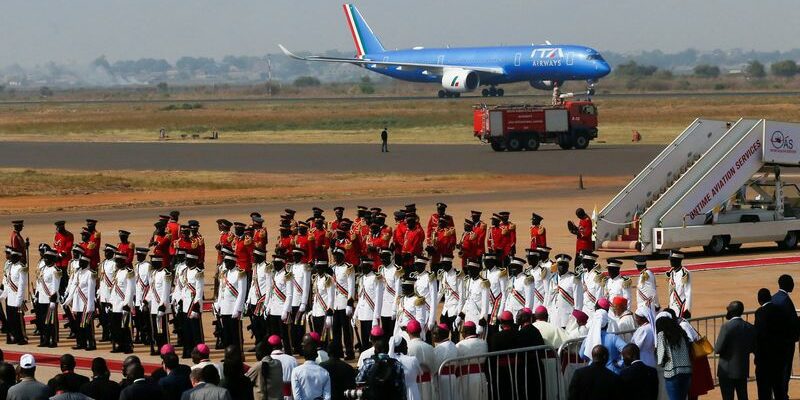by Philip Pullella and Estelle Shirbon
JUBA (Reuters) – Pope Francis arrived in South Sudan, a young country struggling with war and poverty, on Friday for a “peace pilgrimage”, accompanied by heads of the Anglican and Presbyterian churches in Scotland.
South Sudan, a former region of Sudan, became independent in 2011 but civil war broke out two years later, and violence and hunger persist despite a peace agreement signed between the two main protagonists of the conflict, President Salva Kiir and Vice President Riek Machar.
On the eve of the arrival of the sovereign pontiff in Juba, 27 people were killed in the state of Central Equatoria, that of the South Sudanese capital, in violence between herders and a local militia.
The pope is traveling with the Archbishop of Canterbury, Justin Welby, the head of the Anglican Church, and Iain Greenshields, moderator of the General Assembly of the Church of Scotland.
Between them, these dignitaries represent the main religions still active in South Sudan, a predominantly Christian country.
Justin Welby said he was horrified when he learned of the recent violence. “This is a story we hear too often across the country. I call again for another way: for South Sudan to unite for a just peace,” he said.
The pope had wanted to visit South Sudan for years, but preparations had been repeatedly pushed back over security concerns.
In April 2019, a memorable gesture of his pontificate, the pope knelt down to kiss the feet of the protagonists of the conflict during a meeting at the Vatican, urging them not to fall back into civil war.
François was to deliver a speech this Friday during a meeting with the authorities, civil society and the diplomatic corps.
On Saturday, the three Christian dignitaries will meet with a group of internally displaced people to hear their testimonies.
Francis will celebrate Mass on Sunday before flying back to Rome.
The 86-year-old Pope is making his third trip to sub-Saharan Africa since his election in 2013.
Before joining South Sudan, he traveled to the Democratic Republic of Congo (DRC), where he denounced the “poison of greed” and the plundering of resources at the origin of the conflicts which bloody the country, and collected the words of victims of atrocities.
(French version Jean-Stéphane Brosse, edited by Blandine Hénault)
©2023 Thomson Reuters, all rights reserved. Reuters content is the intellectual property of Thomson Reuters or its third party content providers. Any copying, republication or redistribution of Reuters content, including by framing or similar means, is expressly prohibited without the prior written consent of Thomson Reuters. Thomson Reuters shall not be liable for any errors or delays in content, or for any actions taken in reliance thereon. “Reuters” and the Reuters Logo are trademarks of Thomson Reuters and its affiliated companies.
